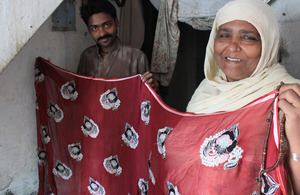Helping women open up for business in Pakistan
How UK support is helping poor women access micro credit loans to set up small businesses

Sughra Baji proudly displays a product from her cloth embellishment business. Picture: Victoria Francis/ DFID
Sughra Baji lives in Mughalpura, Lahore in Pakistan. She used to work on a piecemeal basis for meager wages, often just 50 rupees (about 40p) a day. Thanks partly to UK aid, Sughra Baji obtained her first microfinance loan 10 years ago. With her loan she set up her own small cloth embellishment business. Now she earns up to £20 on a good day and gives work to more than 25 other local women, providing them with a dignified way of earning a living and boosting her community.
In Pakistan more than half the adult population, and two-thirds of women, do not have bank accounts or access to financial services. Microfinance loans have helped thousands of women in Pakistan to start their own small business, helping to increase their family’s incomes and in the process creating new jobs for other people.
Investing in jobs and opportunities
Sughra explains, “On average, my daily takings range from 700 on a very slow day to 2500 rupees on a good day, and that is good profit. I’ve bought a refrigerator and purchased some land in the village.
“I now send 2 of my sons to school. My elder son didn’t go to school as we couldn’t afford it before, but he helps me with my business so has a good job. I was able to give the gift of marriage to both my daughters. In the future I want to buy the cloth and stones in bulk direct from Karachi, and set up other women with their own businesses who I will supply to.”
The British government through UK aid will continue to support microfinance, focusing on women. Women typically set up small enterprises with their loans, such as garment making, weaving, a shop, or simple manufacturing.
Creating jobs, building workforce skills, and helping poor people set up small businesses by widening access to micro credit loans are the most effective ways of enabling people to lift themselves out of poverty.
By earning more money and gaining business skills, women and their families can escape poverty, invest more in their children’s health and education and, as well as better participate in the wider community.
Facts and stats
The UK will continue to support the growth of a vibrant, resilient, and innovative small and micro business sector in Pakistan. UK aid has:
- backed 103,000 microfinance loans between spring 2010 and spring 2012, mostly to poor women, so they can lift themselves out of poverty
- provided cash payments directly to 200,000 households over the last year in flood affected areas of Pakistan, helping some 1.3 million individuals to meet their immediate life-saving needs
- helped set up the first and largest branchless banking system in Pakistan, enabling many of the poorest to access financial services for the first time. More than 1 million people are now managing their money from their mobile phone, and over 25 million transactions were facilitated in the first quarter of 2012 alone
- provided technical advice to the government of Pakistan on managing its economy, and on how to plan and spend its budget more effectively
By 2015, the UK will:
- help 1.23 million poor people (more than half women) access microfinance loans
- support entrepreneurs across Pakistan by underwriting 4,000 loans to small and medium businesses
- work with the government of Punjab to provide job and skills training to at least 135,000 people so they can get jobs and lift themselves out of poverty
- provide small monthly cash transfers to 315,000 of the poorest women to meet their family’s essential needs
- nurture innovation by calling for and then funding the best new ideas to provide banking, micro credit, and other financial services to more poor people
- help transform microfinance from donor-dependent unregulated institutions in to financially sustainable regulated banks
Updates to this page
-
Updated the UK's results in Pakistan and aims for 2015
-
First published.